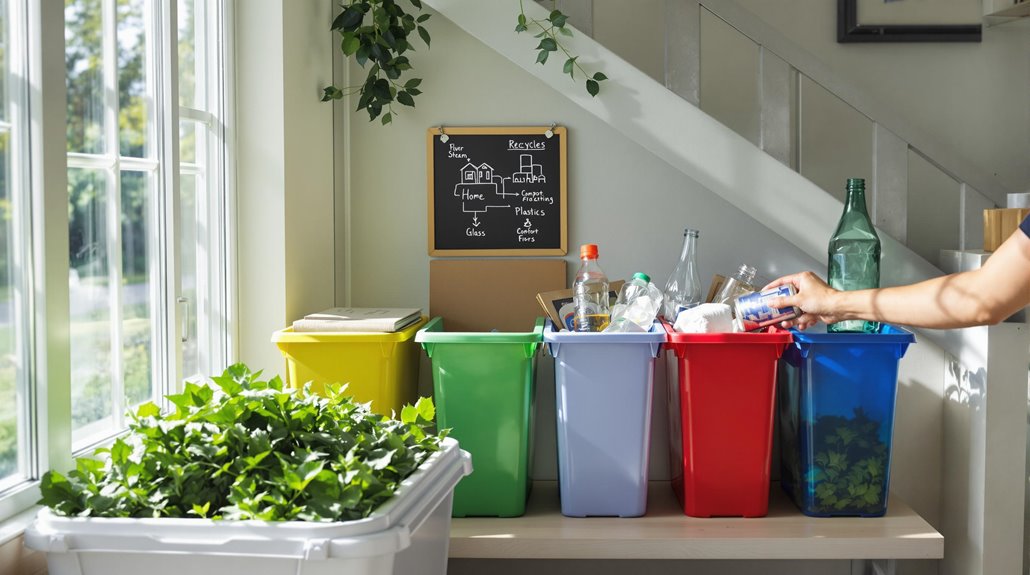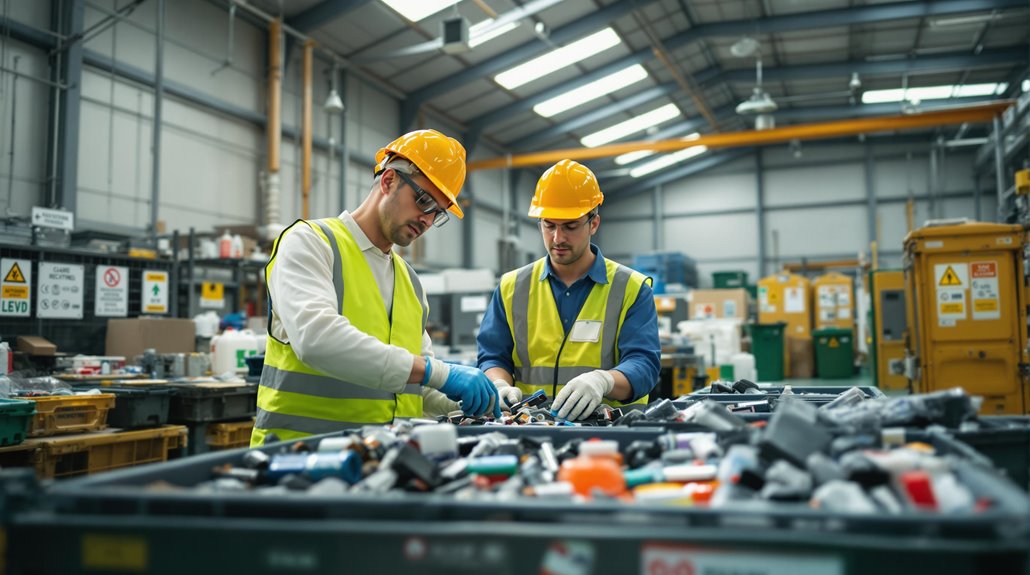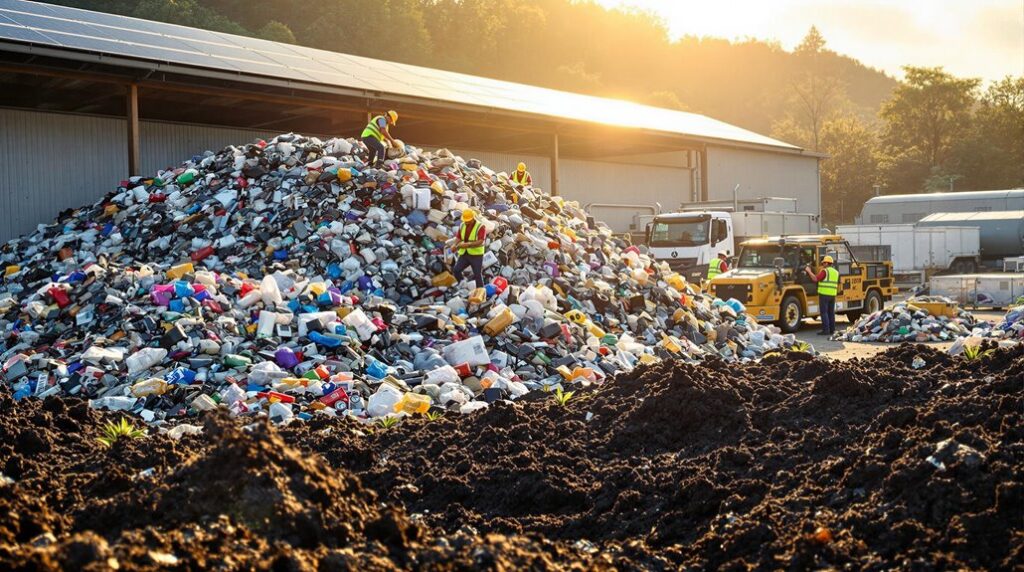Eco-friendly junk disposal requires proper sorting techniques and responsible management strategies. Optical systems and AI-powered robotics improve recycling efficiency, while donating usable items extends product lifecycles. Hazardous materials must follow federal regulations to prevent environmental harm. Smart disposal practices include waste segregation, using certified recyclers, and participating in community repair events. Implementing these approaches reduces landfill contributions, conserves resources, and supports local communities in need. The following guide offers extensive steps for minimizing your disposal footprint.
Sustainable Sorting: Making the Most of Your Waste Stream

In today’s waste management landscape, sorting has evolved from a simple chore to a sophisticated science with far-reaching environmental implications. Advanced technologies now drive this evolution, with optical sorting systems identifying materials by reflectivity and color, while AI-powered robotics handle complex sorting tasks with improved accuracy. Professional junk removal services streamline the sorting process while saving valuable time and resources. Properly segregated waste streams create significant environmental benefits. Closed-loop recycling programs for aluminum and paper conserve 14,000 kWh of energy and 17 trees per ton processed. Meanwhile, organic waste pre-treatment systems boost biogas production and reduce landfill dependency. Smart bins with IoT capabilities optimize collection routes by monitoring fill levels in real-time. Communities implementing proper sorting protocols have achieved remarkable results, with some regions such as Sweden reaching a mere 1% landfill rate for household waste—proof that sustainable sorting works.
Beyond the Landfill: Repurposing and Donation Strategies
While landfills continue to absorb the bulk of America’s waste, savvy consumers and environmentally conscious businesses are exploring alternatives that extend the useful life of discarded items. Effective donation strategies begin with identifying suitable items in good condition, focusing particularly on furniture, clothing, and electronics.
Targeting suitable recipients guarantees items find their best use, with shelters being prime destinations for furniture donations. This thoughtful approach creates a more sustainable cycle of consumption. Professional junk removal services can help transform unwanted items into valuable donations through careful sorting and distribution.
- Sort items by condition before deciding whether to donate
- Research local organizations with specific needs
- Clean all items thoroughly before donation
- Take photos of valuable donations for tax purposes
- Contact recipients in advance for large furniture items
These practices enable individuals to reroute usable materials from waste streams while benefiting communities in need.
Handling Hazardous Materials With Environmental Responsibility

Handling hazardous materials properly stands as a critical responsibility for both individuals and businesses concerned with environmental protection. Federal regulations, including RCRA Subtitle C, establish clear legal obligations that carry serious consequences if ignored. Even a small amount of improperly disposed waste—such as one pint of oil—can devastate an entire acre of water and harm aquatic ecosystems.
The stakes extend beyond environmental damage to personal liability. Violators face potential criminal charges, civil penalties, fines, and even imprisonment. Transportation and disposal of hazardous materials must follow strict EPA, DOT, and state-level guidelines to prevent contamination of soil and water resources. Organizations should develop thorough protocols similar to Cornell’s Environmental Health and Safety Policy 8.6, ensuring proper management practices that protect both the environment and their legal standing.
Minimizing Your Eco-Footprint Through Smart Disposal Practices
Countless everyday disposal decisions contribute to an individual’s overall ecological impact, making smart waste management practices vital for environmental preservation. Implementing a circular approach to disposal reduces landfill contributions while conserving valuable natural resources. By segregating waste properly and understanding local recycling guidelines, individuals guarantee materials enter appropriate processing streams rather than ending up in landfills. Certified appliance recyclers can properly handle refrigerants and hazardous components when disposing of old household appliances.
- Donate usable items to extend product lifecycles and help communities
- Compost food scraps and yard waste to reduce methane emissions
- Purchase products made from recycled materials to decrease demand for raw resources
- Partner with eco-certified disposal services for transparent waste management
- Participate in community repair events to extend product lifespans
These practical steps create meaningful environmental impact without requiring significant lifestyle changes, making sustainable disposal accessible to everyone regardless of circumstances.
Frequently Asked Questions
How Much Does Eco-Friendly Junk Removal Typically Cost?
Eco-friendly junk removal costs $140-$400, with $250 average nationwide. Price depends on location, access, volume, and material type.
Can I Receive Tax Deductions for Donating Unwanted Items?
Qualifying donations to 501(c)(3) organizations are tax-deductible. Items must be valued at fair market value. Donors must itemize deductions on Schedule A.
What Items Are Surprisingly Recyclable That Most People Throw Away?
Recyclable items commonly mistaken as trash:
- Mattresses (metal springs, foam, fabric)
- Coat hangers (plastic, metal)
- Blister packets (aluminum, plastic)
- Worn shoes (rubber, leather, fabric)
- Carpets (synthetic fibers, backing materials)
How Can I Find Certified Green Junk Removal Companies?
Check for:
- e-Stewards certification
- ISO 14001 certification
- Sustainability reports
- Waste tracking documentation
- Local charity donation partnerships
Are There Municipal Incentives for Choosing Sustainable Disposal Methods?
Municipalities offer:
- Collection fee discounts
- Tax incentives
- Service subsidies
- Rebates
- Grants for eco-friendly waste removal
References
- https://planetpristine.com/sustainable/waste/eco-friendly-waste-disposal-methods/
- https://alloutjunkfl.com/blog/the-ultimate-guide-to-eco-friendly-junk-removal-practices/
- https://twomenandajunktruck.com/eco-friendly-junk-disposal
- https://flatrate-junkremoval.com/blog/ecofriendly-junk-removal-green-approach/
- https://www.metrowestdisposal.com/eco-friendly-junk-disposal
- https://burcellteam.com/articles/top-strategies-for-effective-community-waste-management/
- https://jdogjunkremovalrdsc.com/donating-made-easy-a-guide-to-eco-friendly-junk-disposal/
- https://www.automate.org/news/revolutionizing-waste-management-exploring-sustainable-and-efficient-solutions-for-a-greener-future
- https://checksammy.com/blog/sustainable-practices-in-junk-removal-reducing-waste-and-environmental-impact/
- https://www.triumvirate.com/blog/5-most-popular-choices-for-waste-disposal-which-is-most-sustainable

